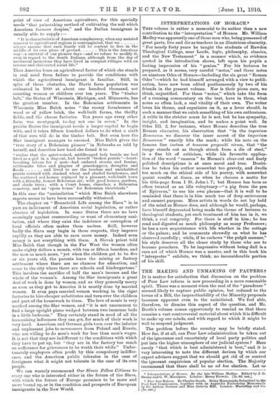INTERPRETATIONS OF HORACE.*
Tars volume is rather a memorial to its author than a new contribution to the " interpretation " of Horace. Mr. William Medley was apparently one of those men who, being possessed of great parts, live and die as teachers in an illustrious obscurity, " For nearly forty years he taught the students of Rawdon Theological College, near Leeds, logic, philosophy, classics, and the New Testament" in a manner which, as evidence quoted in the introduction shows, left upon his pupils a lasting impression of his " genius." For his lectures he prepared, as it seems, very careful "notes," and these notes on nineteen Odes of Horace—including the six great " Roman Odes "—which he had himself arranged with a view to publi- cation, have now been edited posthumously by two of his friends in the present volume. Nor is their pious care, we think, unjustified. For these "notes," which take the form of a running commentary on the text, have in them, what notes so often lack, a real vitality of their own. The writer loves his theme, and expatiates on it, as a lover should, in such a manner that we catch something of his own enthusiasm. A critic in the stricter sense he is not, but he has sympathy, insight, and imagination, and he makes a point well. In Odes III. '2, for instance, where Horace describes the true Roman character, his observation that "in the ingenium Romanum we discover the inner secret of the imperium. Romanum" exactly hits the mark ; while his note on the famous line iustunt et tenacem proposal virum, that " the image stands out as though struck from a die of steel," is a fine bit of criticism, while his favourite applica- tion of the word " cameos " to Horace's clear-cut and finely polished descriptions is at once novel and true. Doubt- less he takes his author somewhat too gravely, and dwells too much on the ethical side of his poetry, with somewhat quaint results at times, as when he chooses a motto for his title-page from 1 St. John i. 7; but Horace has been so often treated as an idle voluptuary—" a pig from the pen of Epicurus," to use his own phrase—that it is well to bs reminded that there is in him much too of deep seriousness and earnest purpose. Mere artists in words do not lay hold of the mind as Horace does, and although he would, perhaps, have himself deprecated being made the theme of lectures to theological students, yet such treatment of him has in it, we think, a real congruity. For there is stuff in him ; he has read and digested as much philosophy as many Professors ; he has a rare acquaintance with life whether in the cottage or the palace ; and he comments shrewdly on what he has observed carefully ; while, if he eschews " the pulpit manner," his style deserves all the closer study by those who are to become preachers. To be impressive without being dull is a rare art of which Horace was a master, and in this book his " interpreter " exhibits, we think, no inconsiderable portion of his skill.














































 Previous page
Previous page